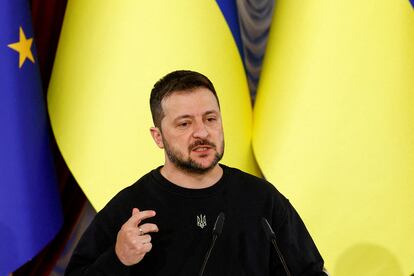Ukraine faces a long process of negotiations to join the EU
Kyiv has rapidly reformed a multitude of laws over the past two years so that the European Council would give free rein to discussions over membership of the bloc


It would be the largest state in the European Union and also the first founding republic of the former Soviet Union to join the bloc but, for this to happen, Ukraine still faces many years of reforms. The negotiation process that is underway will have to adapt Kyiv to 28,000 EU standards, as well as initiating a tough dispute over its status as an agricultural power. Above all, it will first have to find a way to accommodate a future member in permanent conflict with Russia, and probably with part of its territory occupied by the Kremlin’s arsenal.
The announcement Thursday that Brussels is officially opening negotiations with Ukraine over EU membership was greeted with jubilation in Kyiv. “This is a victory for Ukraine. A victory for all of Europe. A victory that motivates, inspires, and strengthens,” said President Volodymyr Zelenskiy. Ukraine had been knocking on the doors of the EU since 1993, but it was not until Russia unleashed its invasion in 2022 that Brussels considered the stability of the continent depends on Kyiv’s integration under the umbrella of European democracy and welfare.
Ukraine needs good news. The war is expected to be long, with little prospect of recovering territory occupied by Russian troops until at least 2025, according to analysts. Ukraine’s prime minister, Denis Shmihal, and the deputy prime minister for European Affairs, Olga Stefanishina, have expressed their optimism that membership can be achieved in two years. “We have to communicate a realistic picture, and not dreams, to the public,” Victoria Melnik, director of the European integration program at the Ukrainian Center for Political and Legal Reform, told a conference last October. “The negotiations will last for years. This should be taken into account to avoid frustrations. It will certainly not be a couple of years,” says Jennes de Mol, the Dutch ambassador to Kyiv.
The Ukrainian government has hastily reformed a multitude of laws in the past two years for the European Council to make Thursday’s decision. Stefanishina detailed on her social networks that the Ukrainian legal body has already introduced 1,625 EU norms. Ivan Nagorniak, deputy director of the Government Office for European Integration, specified in October that these norms were those required from the outset to be able to open negotiations, but 28,000 still remain to be integrated. And, as De Mol stressed, it is not just a matter of the Ukrainian regulatory code approving them: “It will be necessary to see how they are applied, and that will take time.”
The European Commission and most EU governments have been benevolent towards Ukraine. Significant demands that were set for negotiations to begin have been met halfway. Last week, Zelenskiy signed the reform of four laws, amendments demanded by Brussels. Three of them are linked to the strengthening of anti-corruption bodies. Both the opposition and civil rights organizations have denounced that the reform continues to maintain amendments in the penal code that make it difficult for a judge to investigate cases of corruption in public office.
Another law reformed by Zelenskiy concerned the rights of national minorities in Ukraine. The president assured that the amendments to the law follow the recommendations of the Venice Commission, which demands that the Russian language be protected in Ukraine, as established in the Constitution. But the reformed minority regulation does exactly the opposite, permanently marginalizing it from the public, education, and media spheres.
The possible integration of Ukraine into the EU will require profound changes in multiple areas in a country that, if it has any ideology, as Zelenskiy has stated, it is libertarianism, the prioritization of individual freedoms against minimal state intervention. At conferences in October on Ukraine’s EU integration, Oleksander Saienko, former Minister of Reforms during Petro Poroshenko’s presidency (2014-2019), insisted that it will be necessary to transform the Ukrainian mentality that state intervention is negative: “It is now a priority to create a competent and less corrupt corps of civil servants. Being effective in this is key to accessing the EU,” Saienko said. If there is one thing Ukrainians fear in their desire to join the bloc, according to this newspaper’s many interviews with citizens over the past year, it is bureaucracy, the rules that will have to be adopted on a day-to-day basis, whether in taxation, labor, or commercial production.
One of the biggest battles Ukraine will probably have to fight to gain EU membership will be to defend its agricultural sector against the interests of other major producers. Although it is waging a war against Russia in which its very existence is at stake, its neighbors Slovakia, Poland, and Hungary have vetoed the import of certain Ukrainian products, especially cereals, claiming that they represent unfair competition. The same has happened in the transport sector. Trade unions in these countries denounce that the working conditions of Ukrainian transporters, from wages to rest hours, or the uncontrolled use of pesticides in their fields, are incompatible with the European common market. The borders with Poland have been blocked for more than a month by protests in an appetizer of what is to come.
Sign up for our weekly newsletter to get more English-language news coverage from EL PAÍS USA Edition
Tu suscripción se está usando en otro dispositivo
¿Quieres añadir otro usuario a tu suscripción?
Si continúas leyendo en este dispositivo, no se podrá leer en el otro.
FlechaTu suscripción se está usando en otro dispositivo y solo puedes acceder a EL PAÍS desde un dispositivo a la vez.
Si quieres compartir tu cuenta, cambia tu suscripción a la modalidad Premium, así podrás añadir otro usuario. Cada uno accederá con su propia cuenta de email, lo que os permitirá personalizar vuestra experiencia en EL PAÍS.
¿Tienes una suscripción de empresa? Accede aquí para contratar más cuentas.
En el caso de no saber quién está usando tu cuenta, te recomendamos cambiar tu contraseña aquí.
Si decides continuar compartiendo tu cuenta, este mensaje se mostrará en tu dispositivo y en el de la otra persona que está usando tu cuenta de forma indefinida, afectando a tu experiencia de lectura. Puedes consultar aquí los términos y condiciones de la suscripción digital.








































